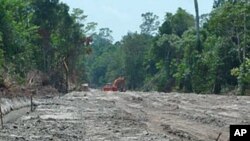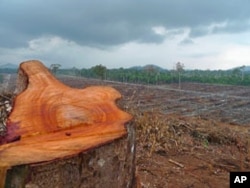In a remote part of northern Indonesia, two companies are battling for control of a piece of land that both say they own the rights to develop. One company says it will protect the land for a carbon-trading program. The other company wants to mine the land, bringing development and jobs to locals. where corporate ambitions and local needs are jockeying for control of Indonesia’s forests.
The sounds of chainsaws and excavators clawing into hard earth overwhelm the calls of rare birds and gibbons gathered in the few clusters of forest that remain here.
West Kalimantan is an isolated region with little government oversight, sporadic phone reception, pockmarked roads and poor villages with limited access to schools and health care.
Farmers already have degraded much of the land through slash-and-burn agriculture. Now, companies are seeking access to mineral deposits and vast swaths of the remaining forest.
Conservation vs. mining
In Lamon Satong, two companies are battling about land they both say they have government-granted rights to develop. On one side is palm oil firm P.T. Kayung Agro Lestari, or PT KAL. On the other side is Laman Mining.
Mohamad Akhir bin Man, PT KAL’s general manager, said the companies are at loggerheads.
“We have this overlapping license with Laman Mining and they seem to be working on their own, without even informing us they’re coming in, let alone getting consent,” said Akhir.
PT KAL wants to conserve a chunk of its 18,000-hectare concession for a U.N.-backed carbon-trading program. The plan allows developed countries to pay heavily forested developing nations to reduce their carbon emissions by saving trees. The company and international investors have jointly spent about $200,000 surveying the land to determine its viability for carbon trading.
Laman wants to mine bauxite, the main ore used in aluminum. If the company begins digging, it would prevent the forest from being utilized for carbon trading.
Rising tensions
Green groups say conflicts like this are increasingly common, given a shortage of fertile land, and the rush to claim and develop natural resources. They blame vague zoning laws and local officials eager to profit from land-use contracts.
Aditya Bayunanda, a forest campaigner from the World Wildlife Fund, said “Overlapping permits, permits that have gone idle, are all over the place. And, it even has been a hindrance to more responsible investment, people wanting to invest on doing some good plantations where you don’t have to open up the forests.”
Such opportunism threatens to undermine promises made by President Susilo Bambang Yudhoyono to cut Indonesia’s greenhouse gas emissions by 26 percent by 2020. It is also raising questions about whether the government can oversee its rapidly dwindling forests.
Officials say they are working to change the forest model from one of exploitation to one of preservation. But in impoverished parts of Indonesia, the attraction of much needed jobs can take precedence over preserving the forest.
In West Kalimantan, PT KAL executives accuse a regional member of parliament, Antonius Salim, of taking kickbacks from their competitor to develop the land.
Need for local jobs
Salim denies taking kickbacks and said he is helping meet his community’s demand for development.
He said he understands the problem is caused by the overlapping license, but said the community needs jobs. He said he would welcome any investor, as long as it provides benefits to the region that will help with economic growth.
A representative for Laman Mining said locals will benefit from its plan. He said the community will allow it to develop several mineral-rich hills, in return for rubber seedlings and much-needed roads.
For PT KAL, the project could be a model example for carbon trading, which would help cover the expenses it pays to protect the forest. That includes regular security patrols to keep out illegal loggers.
Syahrizal Irwan, a senior manager at PT KAL, insists Laman does not have a license to mine. He said Laman only has a license to explore, and if the status of the forest is protected, the company cannot operate there. He said it cannot construct a road or a base camp. Irwan said the status of the forest is a dilemma that needs attention from the government.
For now, the government has not weighed in on the dispute in this remote corner of Indonesia, leaving the carbon trading and the local development in limbo.














